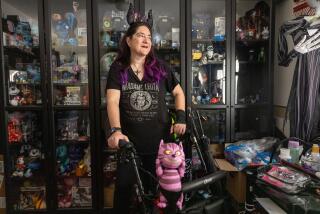Little Things Make a Big Difference for Disabled
- Share via
Ron Mincer carefully rolled his wheelchair under the drinking fountain, nudged his body forward from his seat, wrapped his arm around the water spout, rested his palm on the button and pushed.
As the slender stream bubbled forth, Mincer craned his neck forward over the fountain’s silver tub and drank.
It was an action that many of us would take without thinking twice: a sudden thirst, a quick bow of the head, and on to our appointed tasks.
But for Mincer, a quadriplegic, the simple act required considerable effort.
Watching him was not a revelation; I did not need to be reminded that some tasks are not as easily accomplished by the physically impaired. But it was a reminder of the real needs of the disabled for access to everything from drinking fountains and pay phones to washbasins in public restrooms; to everyday things those without physical impairments take for granted.
I recently trailed Mincer, a consultant with the state Department of Rehabilitation, and members of local disabled groups as they toured the new Thomas F. Riley terminal at John Wayne Airport just before its opening.
They provided an eye-opening demonstration that when the disabled speak of access, it is to more than just the blue-lined parking spaces with which we have become so familiar and, for many of us, cavalier.
What would you do if you were confined to a wheelchair, needed to make an urgent call but found the coin slot in the pay phone too high to reach? What if your hearing were impaired and you could not find a phone with an amplifier?
How would you cope if you were visually impaired, needed to use the elevator but could not tell which button belonged to the 17th floor because they are not marked in Braille? What if you are someone like Ken Force, a local travel agent who must use a wheelchair, but who must also spend a great deal of time in public places? Sometimes it is the simplest of things, like a lowered counter at a car rental agency, that would make his life a degree less harried.
Force has worked with airline and cruise ship personnel and developed videos to help raise awareness in the travel industry to the requirements of the disabled.
He notes that their numbers are considerable: more than 20 million Americans with some sort of physical disability who represent perhaps billions of dollars in money spent on travel.
Although Force and others in the disabled community believe the general public is now much more attuned to their needs, they also think the public still has a tendency to equate the issue of accessibility only with people in wheelchairs, neglecting to consider those with other impairments or mobility problems.
They include the elderly whose sight has faltered or who must walk a step slower than they used to, those with temporary ailments like a broken leg, or the young parent with two or three infants in tow.
All of us at some point in our lives could have to rely on some detail, devise or feature that was ostensibly designed to accommodate the “disabled,” Mincer notes.
As I followed the group through the airport terminal, the degree to which our independence is predicated on simple access--not just physical presence but access to the technologies that are the engine of modern life--became ever clearer.
For the disabled that is the crux: The vast majority can lead an independent life--free of the feeling that their disability is a burden to society or a hindrance to themselves--with adjustments that are simple and fairly cost-free, if only people would think of them beforehand.
As the group roamed through the empty terminal, reaching for buttons and telephones, filing into restrooms, maneuvering through narrow aisles in the gift shop, sidling up to the counter in the bar, I was struck when I realized the emotions I was not feeling.
There was little sympathy, pity or sorrow for their plight, only a bit more understanding and an appreciation for the degree of dignity and good humor with which most disabled go about their daily lives.
More to Read
Sign up for The Wild
We’ll help you find the best places to hike, bike and run, as well as the perfect silent spots for meditation and yoga.
You may occasionally receive promotional content from the Los Angeles Times.







